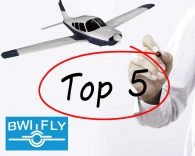Airplane insurance isn’t usually the first thing on your mind when you are looking for a new plane. Typically shopping for a new airplane consists of a lot of spec research, online forum reading and mental anticipation of the awesome possibilities that a new flying machine will bring to you. When you finally get a chance to sit in the left seat of your new bird and after a little excitement wears off, your mind will naturally drift to safety and security.
There is still a great debate ongoing between purchasing an airplane insurance policy vs simply self insuring your aircraft. Having a full-annual airplane insurance policy will give you a sense of security for the additional liability risk you are taking on, by flying an aircraft and you can also purchase hull coverage which protects your investment in the event that your aircraft is damaged.
Purchasing an airplane insurance policy is not as simple and straightforward as auto insurance. Airplane insurance is a specialized industry with a lot of different coverages, companies and stipulations.
Here are the 5 best airplane insurance tips for new aircraft owners:
-
Get in touch with a broker early in the process
- Too many people wait until they are about to purchase or already have purchased a new aircraft before considering insurance. As soon as you have narrowed down a particular make and model, reach out to an aviation insurance professional and start the process.
- A good broker can guide you through the costs, steps and stipulations that go along with an annual airplane insurance policy and give you advice on any preventative steps to take before starting your insurance policy that may get you a better rate.
- You may find that the insurance training requirements for a particular make and model are too high and this should factor into the type of aircraft that you choose to purchase.
-
Make sure you find the right broker who will advocate for you
- One of the absolute most critical parts in obtaining great coverage and competitive rates is finding an experienced insurance broker who specializes in aviation insurance and can help guide you through the process.
- Based on experience, your broker should be able to review your situation including pilot skill and experience level along with the aircraft make and model you are purchasing and recommend the right insurance company. Some companies are better at transitional pilots, others offer lower rates and better coverages for qualified pilots and certain makes and models.
- An experienced broker will not always recommend the lowest priced policy and should instead look at getting you with the best company and building a multi-year insurance plan for you.
-
Get the right coverages to protect you and your aircraft
- Typical airplane insurance policies will include $1,000,000 in total liability coverage, limited to $100,000 per passenger. This liability coverage will protect you from the increased liability you re exposed to while flying an aircraft and specifically applies to bodily injury, property damage and legal defense.
- Optionally you can add hull coverage to protect your investment. Hull coverage provides physical damage coverage for the aircraft itself.
- You should insure your aircraft for the cost that you would incur in replacing it. Aircraft insurance hull coverage is based on Agreed value and does not include depreciation. Here is a cost breakdown for airplane insurance
-
Set up all the important insurance documents before you seal the deal
- If you are financing your aircraft purchase, the loss payee or bank will need to be named on the insurance policy.
- Your airport may want to be named as an additional insured on the policy and sent a certificate of insurance, showing proof of coverage.
- To start an airplane insurance policy, most brokers will typically require a signed application and some form of downpayment.
- When filling out the application, make sure you note any claims, waivers, or violations and discuss with your brokers prior to starting a new insurance policy. If this information isn’t disclosed on the application, your coverage may be voided in the event you have a claim.
-
Sort out any named pilots, ferry pilots of CFI’s prior to your purchase
- Most airplane insurance policies include an Open Pilot Warranty. This section stipulates the basic pilot qualifications required for other pilots (not you) to fly your plane and be covered under the insurance policy. If your CFI, ferry pilot or any other pilots that will be flying your aircraft do not meet these minimums, they need to be added to the insurance policy as a full named pilot. This is better done before the policy has been put into force.
- If you are looking to add pilots that are less qualified than you are, expect an increase or surcharge in the premium. Pilots more qualified will typically incur no extra cost to be added.
- CFI’s giving you instruction should have a CFI non-owned insurance policy to protect themselves.
BWI | The Nation’s Leader In Aviation Insurance
Family Owned | Nationwide | Since 1977
What makes us different? Our office is open 12 hours a day, our team is hand-picked, well-trained and every single customer has their own dedicated Aviation Insurance Professional.
Get a no-obligation, free insurance quote at www.bwifly.com or call 800.296.8595
Continue Reading



